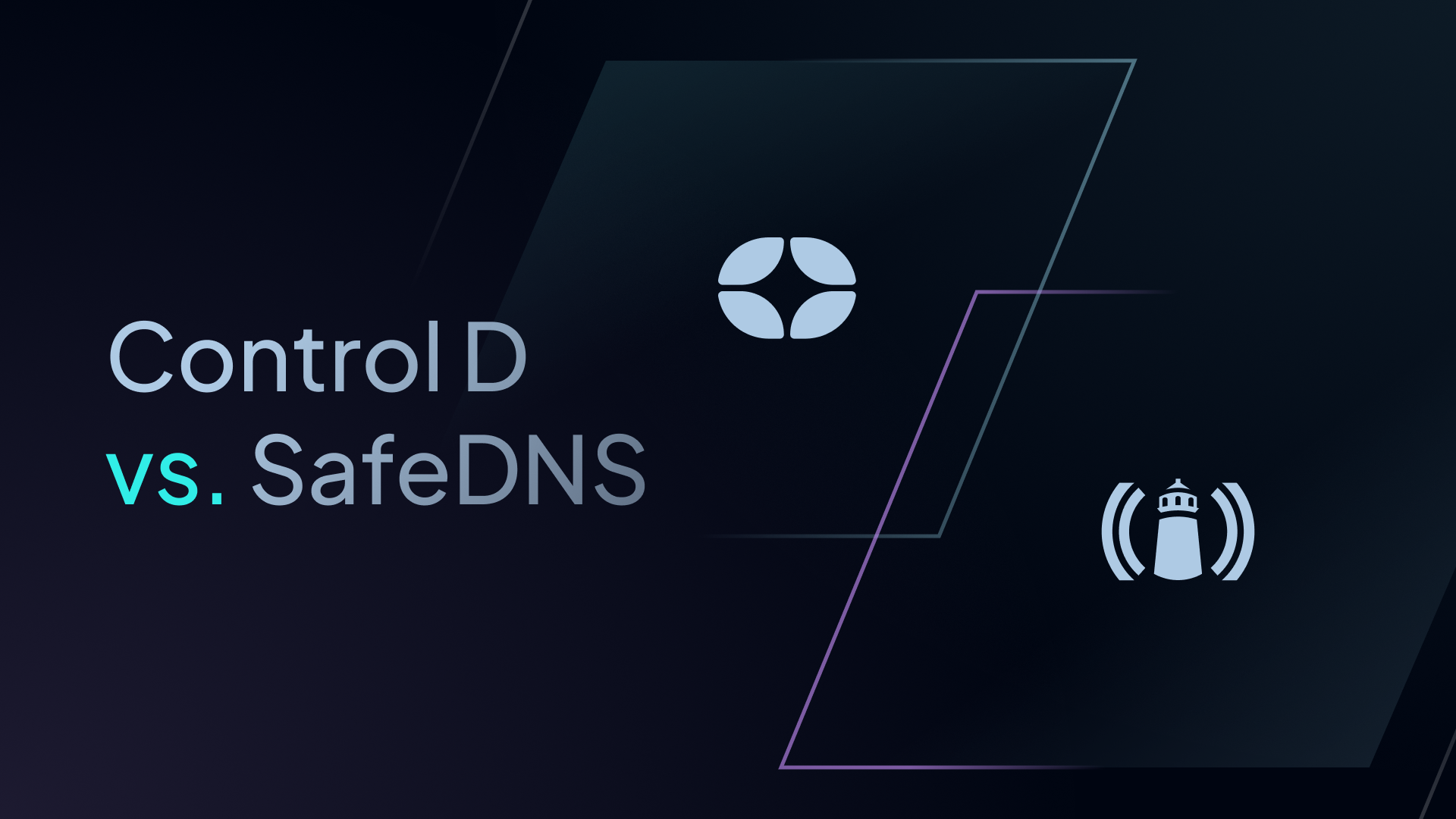Control D vs. SafeDNS: What's the Better Choice?
We compare Control D vs SafeDNS and highlight their differences in plans, pricing, features, customer support, and more.

Both Control D and SafeDNS are well-regarded in the DNS space, offering reliable tools for managing network security and filtering content.
While SafeDNS is a dependable choice for straightforward use cases, it may fall short for organizations requiring advanced features or more granular control – that’s where Control D shines.
In this comparison, we’ll break down and highlight their differences across the following criteria:
- Plans
- Pricing
- General Features
- Clients, Applications, and Integrations
- Analytics & Reporting
- Support
Plans
SafeDNS opts for the traditional three-tiered model, with each subsequent plan having more features and functionality. Here’s a quick breakdown:
- Basic – minimum 15 users
- Pro – minimum 25 users
- Pro+ – minimum 35 users
The Basic plan is barebones, offering basic phishing and malware protection, web filtering, deny/allow lists, and per-group policies. As such, most businesses will need to start with the Pro plan for adequate DNS security and management.
Control D takes the opposite approach by eliminating plans altogether. Instead, they divide organizations into types, as this affects pricing. There are three distinct organization types:
- Enterprise
- SMB
- MSP
- School/Non-Profit
This not only makes onboarding easier but also ensures you have full access to Control D’s complete feature set from the start and automatically qualifies you for future feature updates and improvements at no additional cost.
Pricing
| Pricing | Control D | SafeDNS |
|---|---|---|
| School/Non-Profit | Contact | $400/year/100 users |
| MSP | $1/Endpoint | - |
| Enterprise | $2/Endpoint | - |
| Basic | - | $1/user/month |
| Pro | - | $1.8/user/month |
| Pro+ | - | $2.5/user/month |
SafeDNS’s pricing structure is as follows:
- Basic – $1user/month
- Pro – $1.8/user/month
- Pro+ – $2.5/user/month
They offer a different pricing model for schools and non-profits, which costs $400/year for up to 100 users per campus and a further $4 for every additional user.
As mentioned earlier, Control D has a simple pricing structure that is dependent on organization type:
- School/Non-Profit: $0.50/endpoint/month
- MSP: $1/endpoint/month
- SMB: $2/endpoint/month
- Enterprise: Contact
When comparing the two, it can be tempting to conclude that SafeDNS is more affordable – particularly for businesses. But when factoring in the full suite of features on offer, you may find Control D a more cost-effective platform.
Let’s examine this in further detail.
General Features
| General Features | Control D | SafeDNS |
|---|---|---|
| Basic Malware & Phishing Protection | ✅ | ✅ |
| Advanced ML-Based Malware Protection | ✅ | ✅ |
| Flexible Content Blocking | ✅ | ✅ |
| Blockable Services | 1,000+ | Limited to app categories |
| Advanced Geo-Custom Rules | ✅ | ❌ |
| Modern DNS Protocols | ✅ | DoH only (Pro plan) |
| Traffic Redirection | ✅ | ❌ |
| Remote Browser Isolation | ❌ | ❌ |
| Ad & Tracker Blocking | ✅ | ✅ |
| Per-user Policies | ✅ | Pro plan |
Blockable Services
When it comes to blocking specific apps, platforms, tools, vendors, or websites, Control D and SafeDNS take very different approaches.
Control D offers a feature called Services, giving you the ability to block, bypass, or redirect over 1,000 individual apps, platforms, and groups of websites. This granular control lets you customize rules and policies to your exact needs.
On the other hand, SafeDNS relies on its AppBlocker, which is only available on the Pro plan. Unlike Control D, AppBlocker has a limited selection and can only block broad categories of apps, which offers far less flexibility.
Traffic Redirection
Control D stands out with its Traffic Redirection feature, offering the ability to reroute DNS traffic through proxy servers in over 100 locations across 60+ countries – no VPN required.
Traffic Redirection even allows you to redirect all DNS traffic or selectively apply it to specific Services. For instance, you can route your entire network through a UK server while redirecting Services like Adobe through the U.S.
This flexibility is perfect for businesses or users who need precise control over their network behavior.
SafeDNS does not offer a comparable feature.
Geo-Custom Rules
Control D offers Geo-Custom Rules, a feature that allows you to leverage geo-location data to create specific rules and policies.
For instance, you can:
- Block queries that resolve to IPs in a certain country or ASN
- Block queries made from IPs in a certain country or ASN
- Bypass queries that resolve to IPs in a certain country or ASN
- Bypass queries made from IPs in a certain country or ASN
- Redirect queries that resolve to IPs in a certain country or ASN
- Redirect queries made from IPs in a certain country or ASN
- A combination of the above
Geo-Custom Rules is a handy tool to ensure your employees do not interact with domains and resources from high-risk nations, such as China, Iran, Russia, etc.
This feature is not available with SafeDNS.
Modern DNS Protocols
SafeDNS gives you the ability to enable DNS-over-HTTPS (DoH) and DNS-over-TLS (DoT), but this is only available on the Pro plan.
Control D makes both DNS protocols available to all users.
Per-user Policies
SafeDNS allows you to create policies per group but reserves the ability to enforce policies per user for businesses on the Pro plan.
Control D allows you to enforce policies to the entire organization, specific departments, groups, or individual users from the get-go.
Clients, Applications, and Integrations
| Clients, Apps, and Integrations | Control D | SafeDNS |
|---|---|---|
| Windows | ✅ | ✅ |
| MacOS | ✅ | ✅ |
| Linux | ✅ | ✅ |
| iOS | ✅ | Pro plan |
| Android | ✅ | Pro plan |
| Router/Network | ✅ | ✅ |
| Single Sign-On | ✅ | ✅ |
| RMM Integration | ✅ | ✅ |
| Full API Access | ✅ | ✅ |
| Active Directory Support | ✅ | Pro plan |
Cross-Platform Compatability
Control D is compatible with all device types, from Windows, macOS, Linux, mobile devices, and even browsers and routers.
While SafeDNS’s agent can also be deployed on all major device types, you must sign up with the Pro or Pro+ plan to unlock this functionality.
Active Directory Support
Similar to the above, Control D allows full integration with Active Directory from the jump. Conversely, SafeDNS reserves this feature for the Pro and Pro+ plans.
Analytics and Reporting
| Analytics & Reporting | Control D | SafeDNS |
|---|---|---|
| Admin Action Logs | ✅ | ✅ |
| Full Query Logging | ✅ | ✅ |
| Query Log Retention | 30 days | Up to 1 year |
| Query Log Export | ✅ | ✅ |
| Report Retention | 30 days w/ hourly time series granularity, 1 year w/ daily time series granularity | Up to 1 year |
| Analytics Retention | Up to 1 year | Up to 1 year |
| Data Export | ✅ | ✅ |
| SIEM Log Streaming | ✅ | Pro+ plan |
| Per-user Reporting | ✅ | Pro plan |
| Scheduled Reporting | ✅ | Pro plan |
| Data Storage Regions | NA/EU/AU | ❌ |
| Custom Storage Regions | Small additional fee | ❌ |
Query Log Retention
SafeDNS stores DNS query log data for up to 1 year, whereas Control D stores query log data for up to 30 days.
Report & Analytics Retention
Another difference between Control D and SafeDNS is that SafeDNS keeps statistics and reports for up to 1 year, which can be exported anytime.
On the other hand, Control D allows you to generate a report from the last 30 with hourly time-series granularity or 1 year with daily time-series granularity, both of which can be exported.
SIEM Log Streaming
Security Information and Event Management (SIEM) tools enhance cybersecurity incident responses by enabling instantaneous threat alerts and detailed analysis in one centralized location.
With Control D, you can stream your DNS query log data in real time to your chosen SIEM tool of choice at no additional cost.
SafeDNS reserves this key feature for users on the Pro+ plan.
Per-user Reporting
Per-user reporting is an essential feature in DNS management. It enables organizations to monitor individual user activity and identify potential security threats.
By pinpointing users who may be putting the organization at risk – whether through accessing malicious websites or trying to bypass security policies – administrators can use this information to tailor policies to specific users or train them on best practices.
Control D includes per-user reporting as a standard feature for all users at no extra cost. In comparison, SafeDNS reserves this functionality for its Pro plan.
Scheduled Reporting
Control D allows you to schedule daily, weekly, or monthly reports sent via email, which provide details on how Control D is protecting your organization. The reports include data on:
- Queries – Total number of queries served, blocked, and redirected.
- Top Blocked – Most frequently blocked Filters, Services, and domains
- Top Resolved – Most frequently resolved domains
- Traffic Flow – Source and destination countries, plus destination networks
SafeDNS offers a similar feature, but you must be on the Pro or Pro+ plan.
Data Storage Regions
Another thing to consider is the region where your data is stored, which can impact compliance with laws and industry regulations.
Control D lets you select from three regions: North America, Europe, and Australia. If this doesn’t meet your requirements, they can also offer a custom data storage region for an additional cost.
This level of flexibility is something that SafeDNS does not provide.
Support
| Support | Control D | SafeDNS |
|---|---|---|
| Community Support | ✅ | ❌ |
| Docs/Knowledge Base | ✅ | ✅ |
| Email Support | ✅ | ✅ |
| Advanced Chatbot | ✅ | ✅ |
| Dedicated Manager | ✅ | Pro+ plan |
| Prioritized Phone Support | ❌ | Pro+ plan |
Community Support
Control D goes beyond traditional support channels by fostering an active community on Discord and Reddit. These platforms provide users with a space to share experiences and insights or simply engage with other users.
Additionally, Control D’s Suggest a Feature tool empowers users to actively shape the platform by proposing new ideas or voting on popular suggestions.
This is not possible with SafeDNS.
Dedicated Manager
Control D provides all businesses with a dedicated personal manager who is available for questions and calls at any time.
In contrast, SafeDNS reserves this feature for users on the Pro+ plan.
Priority Phone Support
A feature SafeDNS offers that Control D does not is priority phone support.
However, this feature is only available to Pro+ plan users.
Final Thoughts
When comparing Control D and SafeDNS, it’s clear that both platforms have their strengths.
SafeDNS provides a dependable option for basic DNS filtering and network management, particularly for organizations with simpler needs.
However, for businesses seeking a robust solution that blends advanced features, granular control, customizability, multiple support channels, and detailed reporting capabilities, Control D will be the superior option.


